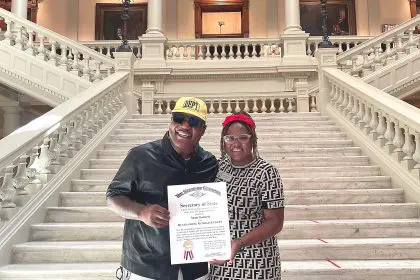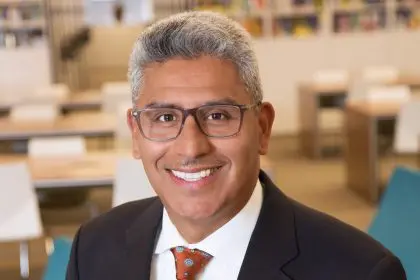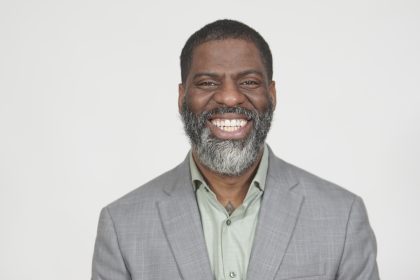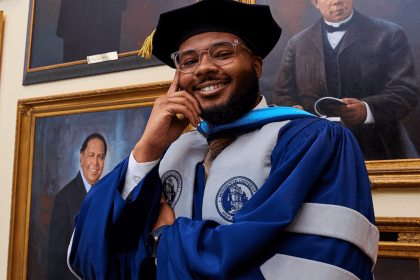
In the complex landscape of American education, few leaders possess both the policy expertise and passionate advocacy displayed by Denise Forte. As president and CEO of EdTrust, Forte has emerged as one of the nation’s most influential voices on education equity, leveraging data-driven insights to transform barriers into opportunities for students of color and those from low-income backgrounds. With over two decades of experience in senior congressional staff roles and service in the Obama administration, Forte brings a uniquely powerful perspective to the ongoing fight for educational justice. In this exclusive interview, she discusses the challenges facing today’s students and shares her vision for a more equitable education system.
What are the three things that all parents need to understand right now as it relates to a child beginning in September, getting ready to start college?
The first thing I would say to parents is: have courage. You need to be courageous in order to move your student through this very significant phase of their lives.
I think the other thing they really need to know is that there is a ton of information out there, but you should really be thinking about two or three core things when you’re thinking about college.
I actually am a mom of an almost college-goer, so I’m thinking about this a lot. I have a 17-year-old in DC Public Schools.
What is it that will make your student feel like they belong there? Belonging is such an important thing for that age.
Two, are they going to be getting the support they need—as a student of color, Black, Brown, as a student with disabilities? Are they going to be in an environment that is going to support them?
And three, what are they going to get out of it? Do they feel that that college, which is just another step on the path, is going to help them to that next step?
Those are three important things—and things that I think about as a mother of an almost college-goer.
What is Ed Trust’s mission?
I am so lucky to have the mission that we have. We are all about making sure our students are successful.
And that really takes a bunch of different efforts these days, when we have an administration—and certainly some leaders—that don’t want students of color or students from low-income communities to be successful, that don’t want to put in the effort to set them up to be successful.
But that’s what we do. And we do it by really looking at the data. What do we know about college success? What do we know about students and what they need in the classroom?
Do they have teachers of color in the classroom? Do they have access to rigorous curriculums? Do they have the information that they need in college to be successful?
We are looking at all of those issues—breaking it down with data, looking at state-level data, college-level data, school district-level data.
And then what’s even more important is we want to put that data—that resource—into the hands of the community so that they can take ownership of the change they want to see.
So for us, our mission is about making sure that our students are successful, making sure our communities have a role in determining that success, and giving them the data to help them.
What resources does Ed Trust offer to help parents analyze educational data?
We have a number of really amazing tools on our website, edtrust.org.
One of them has deep information about what it really costs to go to college. You can check that out.
We have other information out there that looks at what is actually going on with teacher diversity in your state—state by state.
We have other information on whether your student is taking the most rigorous curriculum they could possibly take in their schools.
So a lot of that information is out on our website, edtrust.org, and we’d love to have you check it out. It also has a lot of good background information on how to use the data.
What does it mean to advocate for a rigorous program, and why is it important?
It’s really interesting what we learned from the research.
We learned a few things: that even though a school may say they have Advanced Placement courses—which are really high, rigorous standards—they may not have enough seats in that classroom to be able to support all the students who actually can achieve that and learn that information.
Or, on the flip side, maybe they don’t have enough teachers that can teach that coursework.
Or maybe they do have AP math, but they don’t have the breadth of what’s really offered. Do they have AP Computer Science? AP Calculus?
So when you start to turn around some of this information and really look at what your school’s offering, are they really providing access and opportunity to your student?
And once you peel back that data, you’ll learn that, yes, some schools are doing really well. Others—not so much. But those that don’t have that access—maybe this is the issue—not having enough teachers—that the parent can now advocate around, because they now know that’s what’s the stumbling block.
And until you’re actually able to unpeel that onion, you really won’t know what’s going to make a difference for your student.
How would you change the context of excellence and the conversation about being vigilant in telling our children, particularly Black, Brown, and disabled children, about the importance of studying sciences and mathematics?
I don’t think enough schools are sharing what it really takes to put your young student—to put your son, your daughter—on the pathway to success.
There is a ton of research out there about math, and actually how math can be the gateway to success.
What we know is that if your young person is not taking Algebra by 8th or 9th grade, they can really be shuttled off to the wrong pathway. And that may mean a pathway not leading to college or a great career—because Algebra 1 is one of those fundamentals that our young people need.
And the key here is making sure that you, as a parent, are advocating for that option for your student. And I don’t think a lot of parents know about that.
But the good thing is, there’s a lot of things that school districts are doing right now to help more young people access that path.
There are some wonderful programs in Texas, Washington State, North Carolina, that are allowing more children of color—more children from low-income communities—to access that pathway.
And what they found is impressive.
They found that if you just say, “We’re going to put all of our young kiddos in 3rd and 4th grade on an advanced track,” that—one—they can do it, and they want to do it.
And once you do that—once you invest in a culture of success for all students—we’re learning that they will be successful.
And these opportunities to get on a pathway for Algebra 1, that leads to Geometry, that leads to Calculus, that gets them in the door of college and university that first time around—that’s important.
If you could ask top entertainers and athletes to make songs of success for the community, what would the three things you’d want to hear?
Having a great teacher in all classrooms—I’m sure that you remember, and a lot of folks listening to you right now can put a name on that face of that teacher that really supported them.
For me, it was Mr. Hale in 10th grade math. He asked me and pushed me to think about the right questions that I needed to ask. And there are a ton of Mr. Hales out there. So a great teacher in the classroom.
I think the other thing that is really important—and unfortunately, this administration is trying to downplay its importance and even make it look like it’s illegal—are the social and emotional support that young people need.
I don’t really care whether you want to call it mental health or counselors or school psychologists. We all know that when a student meets an adult in the classroom that really cares for them, makes them feel included in the school—that can make a difference. It could be the lunch lady. It could be the maintenance worker. It can be the bus driver. But those adults really can make a difference. That’s number two for me.
And then number three: after teachers, having a school environment where you can really feel supported.
We want all parents to feel welcome in the classroom and welcome in their schools. Parents play such a critical role in a young person’s educational career. We can’t leave them out of the equation. And more often than not, parents want to be there.
Sometimes, though, there are barriers that are erected by school systems that make parents not feel welcomed. We need to change that—because parents, schools, communities—that’s really the equation that we want, so that young people feel engaged in their schools.
What would you suggest to parents and students trying to figure out where their education will take them post-degree?
It’s funny you ask that question, because I have a computer science degree. And right now, I’m not doing very much with that computer science degree.
I encourage parents: make sure their young person’s mind stays open.
That college opportunity is really a time for young people to explore what they may be interested in. And just because it’s computer science now doesn’t mean that it’s going to be computer science down the road.
Now again—not based on any research—just Denise Forte’s personal anecdote there. But I do think there are a lot of career and college counseling services that are available.
We need more. We certainly need more people to want to undertake that as a path to career, because the sort of lack of information and the lack of guidance that young people experience while on college campuses can really hurt their overall success.
We’ve been looking at college and career counseling in high school, and we’ll have a lot more to offer this summer. But there are things that parents want to—and should—know about what their students are going to have access to in high school that will make their college experience better.
If you were giving a commencement speech at an HBCU, what would you challenge the next generation to understand about their responsibility for future generations?
I think, first and foremost, I would say that their voice matters.
The change that we have seen through young people and their movements has always built up something better for our country. So be courageous and speak up.
Two: make sure that you have a lasting impact on the young people that are coming after you. Everybody needs a mentor. Everybody wants to know that there are some paths to follow, and I think we have to be that storyteller. We have to tell people about the paths they follow.
And lastly, make it fun. Your education career—your ultimate career—should be something that you enjoy. And don’t do it unless you enjoy it. I think those are the three things that I would really tell young people today.
















